八年级新目标上Unit 8 How was your school trip教案
初中英语Unit-8-How-was-your-school-trip单元教学设计以及思维导图
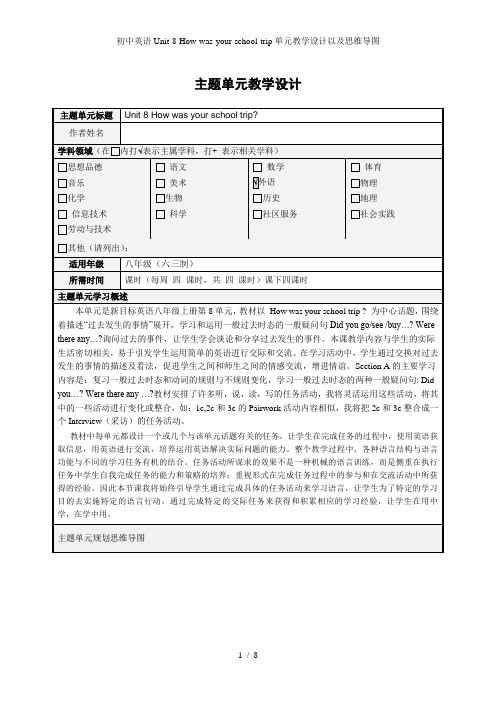
主题单元教学设计主题单元学习目标1、知识与技能:1)语言知识目标:单词:学习掌握词汇Aquarium, science center, gift shop, seal, shark, octopus, autograph, won, ate, Chicago,else等。
功能:描述过去发生的事情语言结构:规则动词和不规则动词的一般过去式;一般过去时的一般疑问句。
其他记录用钢笔及纸张leading-in步骤1:复习热身1. 课前请学生watch the screen师生一起吟唱:go, went; went, goeat, ate; ate, eattake, took; took, takebuy, bought; bought, buy2. 复习一般过去时态Use “did” to talk about the past events. The teacher makessome sentences with some words in the chant. Look at the screen. The teacher asks some questions, and Ss answer them.T: I went to the zoo yesterday. Did you go to the zoo?S1: Yes, I did. /No, I didn’t.T: Did she eat ice cream?S2: Yes, she did. /No, she didn’t.T: Did he take photos?S3: Yes, he did. / No, he didn’t.T: Did they go to beach?S4: Yes, they did. / No, they didn’t.3. 进行机械操练句子和对话,让全体学生都参与活动中来。
Get Ss to make similar sentences with them.设计意图:在音乐中have a chant,调动学生情感,营造氛围,预习本课部分重点动词的过去式;然后让学生通过看课件的图片answer the questions来培养学生的语言能力和听力能力并有意识地复习前面学过一般过去发生的事情。
unit8《howwasyourschooltrip》知识讲解及练习含答案(人教新目标初二上)doc初中英语
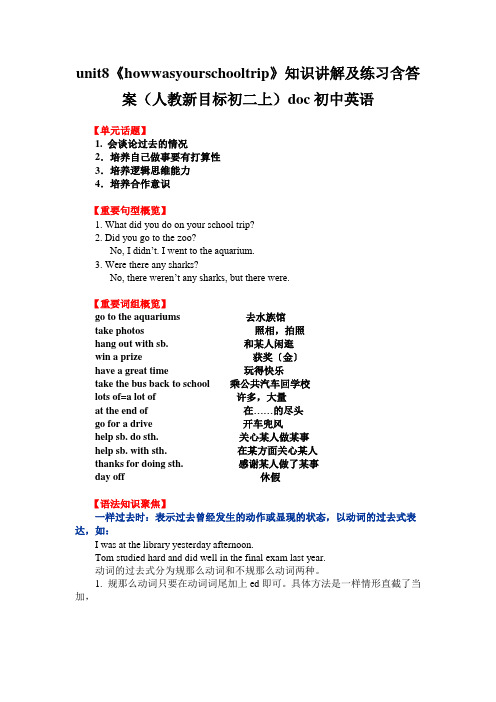
unit8《howwasyourschooltrip》知识讲解及练习含答案(人教新目标初二上)doc初中英语【单元话题】1. 会谈论过去的情况2.培养自己做事要有打算性3.培养逻辑思维能力4.培养合作意识【重要句型概览】1. What did you do on your school trip?2. Did you go to the zoo?No, I didn’t. I went to the aquarium.3. Were there any sharks?No, there weren’t any sharks, but there were.【重要词组概览】go to the aquariums去水族馆take photos照相,拍照hang out with sb.和某人闲逛win a prize获奖〔金〕have a great time玩得快乐take the bus back to school乘公共汽车回学校lots of=a lot of许多,大量at the end of在……的尽头go for a drive开车兜风help sb. do sth.关心某人做某事help sb. with sth.在某方面关心某人thanks for doing sth.感谢某人做了某事day off休假【语法知识聚焦】一样过去时:表示过去曾经发生的动作或显现的状态,以动词的过去式表达,如:I was at the library yesterday afternoon.Tom studied hard and did well in the final exam last year.动词的过去式分为规那么动词和不规那么动词两种。
1. 规那么动词只要在动词词尾加上ed即可。
具体方法是一样情形直截了当加,如:clean—cleaned;2. 词尾是不发音字母e的,可只加上d,如:like—liked;3. 词尾为重读闭音节,结尾只有一个辅音字母的,应双写该辅音字母,再加上ed,如:stop—stopped;4. 词尾为辅音字母加y的,应将y改为i再加上ed,如:study studie5. 不规那么动词有其自己的变化形式,只能分不经历。
新目标英语八年级上Unit 8同步阅读 含答案
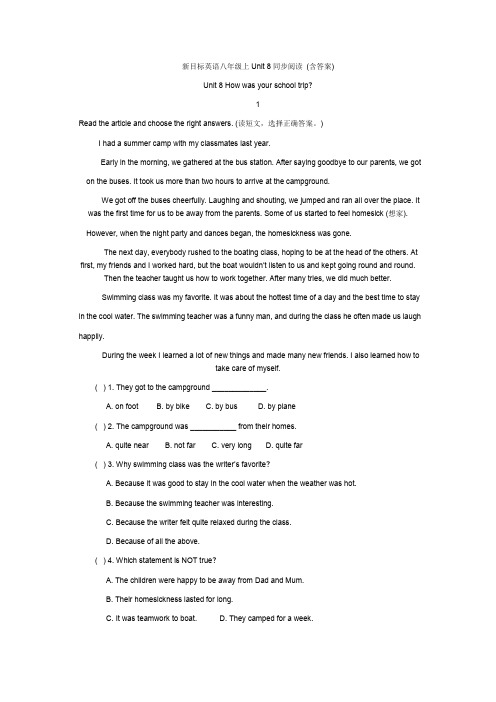
新目标英语八年级上Unit 8同步阅读(含答案)Unit 8 How was your school trip?1Read the article and choose the right answers. (读短文,选择正确答案。
)I had a summer camp with my classmates last year.Early in the morning, we gathered at the bus station. After saying goodbye to our parents, we goton the buses. It took us more than two hours to arrive at the campground.We got off the buses cheerfully. Laughing and shouting, we jumped and ran all over the place. It was the first time for us to be away from the parents. Some of us started to feel homesick (想家).However, when the night party and dances began, the homesickness was gone.The next day, everybody rushed to the boating class, hoping to be at the head of the others. At first, my friends and I worked hard, but the boat wouldn’t listen to us and ke pt going round and round.Then the teacher taught us how to work together. After many tries, we did much better.Swimming class was my favorite. It was about the hottest time of a day and the best time to stayin the cool water. The swimming teacher was a funny man, and during the class he often made us laughhappily.During the week I learned a lot of new things and made many new friends. I also learned how totake care of myself.( ) 1. They got to the campground _____________.A. on footB. by bikeC. by busD. by plane( ) 2. The campground was ___________ from their homes.A. quite nearB. not farC. very longD. quite far( ) 3. Why swimming class was the writer’s favorite?A. Because it was good to stay in the cool water when the weather was hot.B. Because the swimming teacher was interesting.C. Because the writer felt quite relaxed during the class.D. Because of all the above.( ) 4. Which statement is NOT true?A. The children were happy to be away from Dad and Mum.B. Their homesickness lasted for long.C. It was teamwork to boat.D. They camped for a week.( ) 5. Which is the best title for the passage?A. I Leant a LotB. Boating and SwimmingC. On the CampgroundD. My First Summer Camp2Read the passage and answer the following questions. (读短文,回答下列问题。
八年级英语Unit8 How was your school trip评议
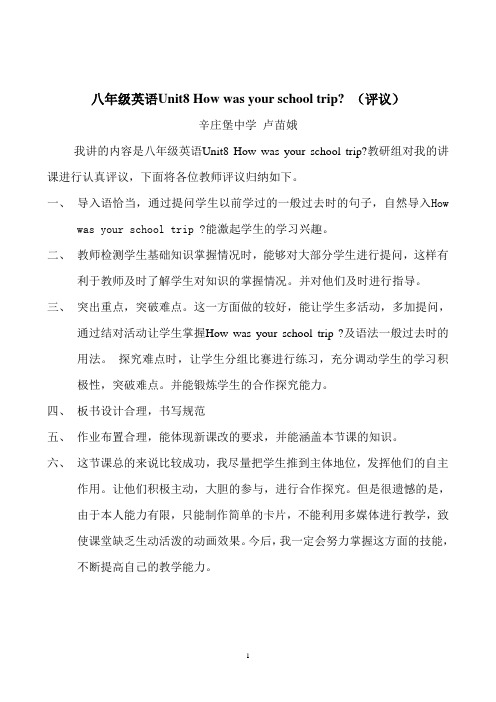
八年级英语Unit8 How was your school trip? (评议)
辛庄堡中学卢苗娥
我讲的内容是八年级英语Unit8 How was your school trip?教研组对我的讲课进行认真评议,下面将各位教师评议归纳如下。
一、导入语恰当,通过提问学生以前学过的一般过去时的句子,自然导入How
was your school trip ?能激起学生的学习兴趣。
二、教师检测学生基础知识掌握情况时,能够对大部分学生进行提问,这样有
利于教师及时了解学生对知识的掌握情况。
并对他们及时进行指导。
三、突出重点,突破难点。
这一方面做的较好,能让学生多活动,多加提问,
通过结对活动让学生掌握How was your school trip ?及语法一般过去时的用法。
探究难点时,让学生分组比赛进行练习,充分调动学生的学习积极性,突破难点。
并能锻炼学生的合作探究能力。
四、板书设计合理,书写规范
五、作业布置合理,能体现新课改的要求,并能涵盖本节课的知识。
六、这节课总的来说比较成功,我尽量把学生推到主体地位,发挥他们的自主
作用。
让他们积极主动,大胆的参与,进行合作探究。
但是很遗憾的是,由于本人能力有限,只能制作简单的卡片,不能利用多媒体进行教学,致使课堂缺乏生动活泼的动画效果。
今后,我一定会努力掌握这方面的技能,不断提高自己的教学能力。
1。
八年级英语Unit 8 How was your school trip 人教版(新目标)知识精讲

初二英语Unit 8 How was your school trip? 人教版(新目标)【本讲教育信息】一. 教学内容:Unit 8 How was your school trip?一. 单元目标:1. 学习询问和谈论过去发生的事情。
2. 通过调查了解全班同学上周末的活动。
3. 通过描写“难忘的假日”,“秋游…”和日记摘抄,学习谈论过去发生的事情。
二. 语言结构:1. 规则动词和不规则动词的一般过去式。
2. 一般过去时的肯定句和否定句。
3. Did you, Were there引导的一般疑问句。
三. 重点词汇:1. aquarium n. 水族馆2. science center科学中心3. gift shop礼品商店4. seal n. 海豹5. shark n. 鲨鱼6. octopus n. 章鱼7. autograph n. 亲笔签名8. win v. 获胜,赢9. ate v. (eat的过去式)吃10. took v. (take的过去式)乘坐、花费11. hung out (hang out)外出12. got v. (get的过去式)得到13. go for a drive开车兜风14. sleep late 睡得晚15. yard sale 现场旧货出售16. day off 放假四. 重点短语:1. take photos 照相2. at the aquarium 在水族馆3. win a prize 获得奖品4. on the school trip 在学校旅行5. have a great time 玩得愉快6. watch a dolphin show 看一场海豚表演7. after that 那以后8. at the end of …在…结束在…末尾9. on the day off 在假日里10. all day 一整天11. e back from…在…回来五. 重难点解析:1. 复习一般过去时一般过去时态是谈论过去最常用的时态,它可以表示短暂而很快就完的动作和事情,时间较长的动作和状况以及重复发生的事情,句中通常有明确的一般过去时的时间状语。
新目标八年级英语上册Unit 8 How was your school trip?讲解与练习
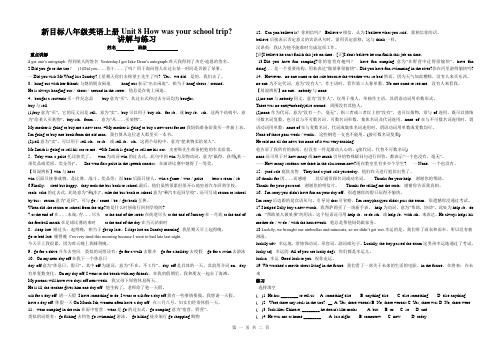
新目标八年级英语上册Unit 8 How was your school trip?讲解与练习姓名班级重点讲解1.get one‟s autograph 得到某人的签名Yesterday,I got Jake Dean‟s autograph.昨天我得到了杰克·迪恩的签名。
2.Did you go to the zoo?(1)Did you……你干……了吗?用于询问别人在过去某一时间是否做了某事。
一Did you visit Mr Wang last Sunday?上星期天你们去探望王先生了吗?--Yes,we did.是的,我们去了。
3.hung out with her friends与她的朋友闲逛hang out表示“出去闲逛”,相当于hang about/around。
He is always hanging out/about/around in the street.他总是在街上闲逛。
4.bought a souvenir买一件纪念品buy意为“买”,其过去式和过去分词均为bought。
buy与sell(1)buy意为“买”,它的反义词是sell,意为“卖”。
buy可以用于buy sth.for sb.或buy sb.sth.这两个结构中,意为“给某人买某物”。
buy sth.from...意为“从……买某物”。
My mother is going to buy me a new coat.=My mother is going to buy a new coat for me我妈妈准备给我买一件新上衣。
I'm going to buy one book from the old man.我打算从这位老人那里买一本书。
(2)sell意为“卖”,可以用于sell sth.to sb.或sell sb.sth.这两个结构中,意为“把某物卖给某人”。
Mr Smith is going to sell his car to me.=Mr Smith is going to sell me his car.史密斯先生准备把他的车卖给我。
Unit-8-How-was-your-school-trip新目标
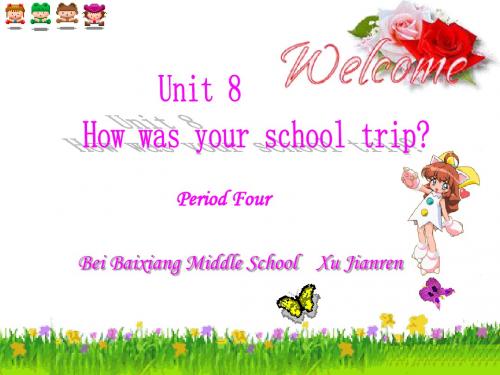
It was
Good great OK fun/funny not good terrible
What kind of day off was
great
OK
?
not good
Read the letter. Take the notes of the things Nick did that day. Then write one or two sentences to give your opinion about the day.
A:Did Sam go to the zoo? B:No,he didn’t.He went to the … A:Were there any seals? B:Yes,there were. A:Did he meet Jake Dean? B:No,he met…
A: Where did Sam go last.. B: He went the aquarium. A: What did he see there ? B:He saw some seals and.. A:Who did he hang out with? B:…
Activities
Yes/No How was it
Go to the beach
Hang out with friends
Have ice cream Take photos
…
You can ask the question like this:Did you go to the
beach?… A report:Lily went to the beach,she thought it was great….
;夜总会棋牌 夜总会棋牌 ;
八年级英语Unit 8 How was your school trip知识精讲
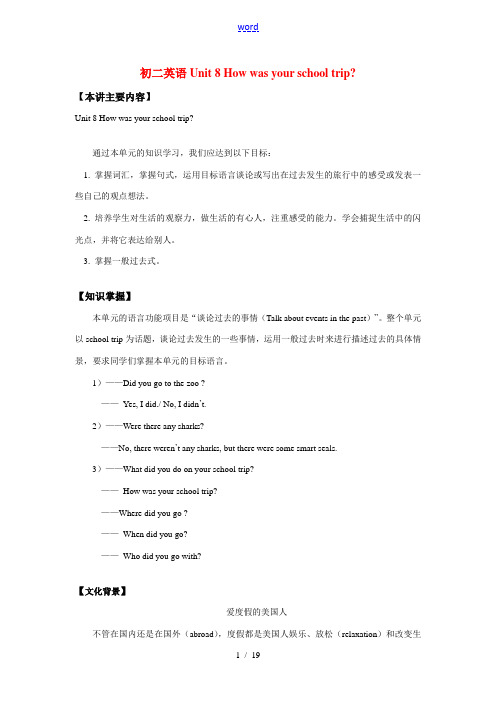
初二英语Unit 8 How was your school trip?【本讲主要内容】Unit 8 How was your school trip?通过本单元的知识学习,我们应达到以下目标:1. 掌握词汇,掌握句式,运用目标语言谈论或写出在过去发生的旅行中的感受或发表一些自己的观点想法。
2. 培养学生对生活的观察力,做生活的有心人,注重感受的能力。
学会捕捉生活中的闪光点,并将它表达给别人。
3. 掌握一般过去式。
【知识掌握】本单元的语言功能项目是“谈论过去的事情(Talk about events in the past)”。
整个单元以school trip为话题,谈论过去发生的一些事情,运用一般过去时来进行描述过去的具体情景,要求同学们掌握本单元的目标语言。
1)——Did you go to the zoo ?——Yes, I did./ No, I didn’t.2)——Were there any sharks?——No, there weren’t any sharks, but there were some smart seals.3)——What did you do on your school trip?——How was your school trip?——Where did you go ?——When did you go?——Who did you go with?【文化背景】爱度假的美国人不管在国内还是在国外(abroad),度假都是美国人娱乐、放松(relaxation)和改变生活环境的极好机会,是一家人一起过闲暇时光、相互加深了解的机会。
美国的大城市是人们旅游的热点之一。
一年到头,曼哈顿(Manhattan)的街上和酒店里都挤满了游人,他们来这里观看摩天大楼(skyscrapers)、参观博物馆和艺术画廊(art galleries)、上歌剧院(operahouses)、戏院和著名的特色商店(specialty shops)或在优雅的餐馆里就餐。
新目标英语教学笔记 八年级上Unit 8 How was your school trip

Language goal1. Talk about events in the past .2. Simple Past TenseLanguage structure1. 过去时规则动词和不规则动词的构成2. 过去时的肯定句和否定句3. Did you ... ?4. Were there ... (Was there)... ?Vocabularyaquarium 水族馆 shark鲨鱼take photos 拍照片 souvenir纪念品 seal海豹autograph亲笔签名 visitor访问者giant巨人或巨物 octopus章鱼go for a drive 开车兜风 take class 上课day off 一天的假 have fun 玩得高兴yard sale 庭院旧货出售现场旧货出售unfortunately 不幸的、倒霉的 kind of 有那么一点science center科技中心 gift shop礼品店Hang outExerciseFill in the blank with the correct word. Select your answer from the following.aquarium observatory autographsfinally telescopemayonnaise souvenirs flour1. Did you see dolphins at the ?2. Jeff likes , so put a lot on his sandwich.3. Tina collects movie star .4. If you look through a , you see stars in the sky.5. Buy at the gift shop.Target language1. What did you do on your school trip ?2. Did you go to the zoo?3. No., I didn't . I went to the aquarium.4. Did you see any seals? Yes, I saw some seals.5. Were there any sharks ? No , there weren't any sharks ; but there were some really smart seals.6. What else did you do ?7. Her friend bought a souvenir.8. Toby won a prize .9. Did you buy anything ?10. How was your day off ?重点、难点:1. 复习一般过去时一般过去时主要用来表示过去发生的动作或状态。
Unit8Howwasyourschooltrip
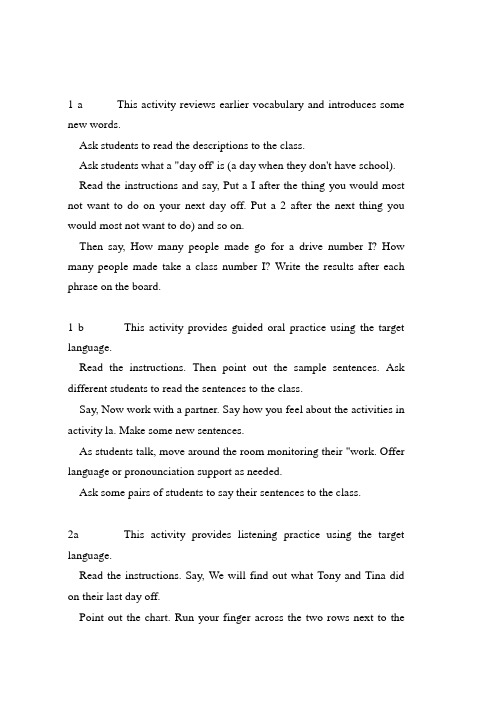
1 a This activity reviews earlier vocabulary and introduces some new words.Ask students to read the descriptions to the class.Ask students what a "day off' is (a day when they don't have school). Read the instructions and say, Put a I after the thing you would most not want to do on your next day off. Put a 2 after the next thing you would most not want to do) and so on.Then say, How many people made go for a drive number I? How many people made take a class number I? Write the results after each phrase on the board.1 b This activity provides guided oral practice using the target language.Read the instructions. Then point out the sample sentences. Ask different students to read the sentences to the class.Say, Now work with a partner. Say how you feel about the activities in activity la. Make some new sentences.As students talk, move around the room monitoring their "work. Offer language or pronounciation support as needed.Ask some pairs of students to say their sentences to the class.2a This activity provides listening practice using the target language.Read the instructions. Say, We will find out what Tony and Tina did on their last day off.Point out the chart. Run your finger across the two rows next to thenames Tony and Tina. Say, Look only at these two rows. Put a checkmark after each activity to show if Tony did it or if Tina did it. Play the recording the first time. Students only listen.Point out the sample answer. Say, There is a checkmark next to Tina's name and under the words "went camping in the rain" because Tina, not Tony, went camping in the rain.Play the recording the second time. This time students make checkmarks on the chart.Check the answers.2b This activity provides listening practice using the target language.Read the instructions. Say, What did Tony and Tina say about their last day off? Point out the list of statements. Say Write the name of the person who said each statement on these lines.Play the recording the first time. Students only listen.Then play the recording a second time. This time say, Now write in your book who said each statement. You may wish to stop the recording after each line or two to give students a chance to finish writing in their books.Correct the answers.2c This activity provides oral practice using the target language. Read the instructions. Say, Now you can talk about your last day off. Ask students to say what they did on their last day off. Write these examples on the board. Ask questions such as What is a good day off?Why? Did you... ?Ask students to work in pairs.Ask some pairs of students to present their dialogues to the rest of the class.1 This activity focuses on vocabulary introduced in the unit. Ask students to fill in the blanks on their own. In some cases, students may need to use another form of the word, for example adjusting for tense or subject / verb agreement. Tell them that they can find all the words in the preceding unit.Check the answers.Ask students to make their own sentences with the words, preferably sentences that are meaningful.Write a number of students' answers for each word on the board. Underline any mistakes (it is not necessary to say which student made the mistake) and ask student to suggest how to correct the mistake.2 This activity provides writing practice using the target language of the unit.Bring some pictures of different cities. Ask students to focus attention on them and then to say which cities they are.Write the name of one of the cities on the board. Elicit a few interesting things that people can do in that city. Say, Now imagine that you went to one of these cities. Write a letter to a friend about your trip. Focus students on the questions on the left. Ask a student to read them to the class. Say, Answer these questions in your letter.Walk around the class offering language support where necessary.Just for Fun!This activity provides reading practice with the target language.Ask two students to read the dialogue between the two sharks to the class.Ask the class why the little shark thinks the kids are clever (because they stayed out of the water).cture.。
How was your school trip教案
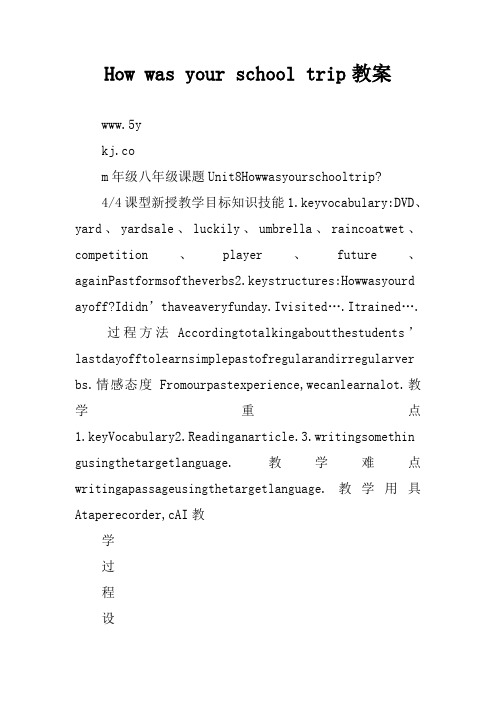
How was your school trip教案www.5ykj.com年级八年级课题Unit8Howwasyourschooltrip?4/4课型新授教学目标知识技能1.keyvocabulary:DVD、yard、yardsale、luckily、umbrella、raincoatwet、competition、player、future、againPastformsoftheverbs2.keystructures:Howwasyourd ayoff?Ididn’thaveaveryfunday.Ivisited….Itrained….过程方法Accordingtotalkingaboutthestudents’lastdayofftolearnsimplepastofregularandirregularver bs.情感态度Fromourpastexperience,wecanlearnalot.教学重点1.keyVocabulary2.Readinganarticle.3.writingsomethin gusingthetargetlanguage.教学难点writingapassageusingthetargetlanguage.教学用具Ataperecorder,cAI教学过程设计教学内容及教师活动学生活动设计意图Step1.Greetings1.checkthecompositionthestudentshave writtenabouttheirlastdayoff.Askstudentstoreaditalou dtotheirpartnersfirstandthenreadforallthestudents.2 .Readtheoldwordsandcorrectthepronunciation.Step2Pre sentationI.wordstudy1.Teachergivethechinesemeaningo fthisperiodletstudentsgivetheEnglishDVD、yard、yardsale、luckily、umbrella、raincoatwet、competition、player、future、againII.3a1.LetstudentsreadtheletterwhichNickwrotetoTomandgivet heopinionsabouttheday.2.Letstudentsreadtheletteragaintoturnitintoaconversat ion.III.3b1.SupposeyouareTomandwritethislettertoNic k.Pleasegoovertheletterandfillintheblanks.2.Self-ch eckLetstudentsfillintheblanksinpart1andpayattention tothetensesandformsofthewordsuchasaboutlivinginthef uture.3.Letstudentswriteacompositioninoralaccording totheinformationonthebook.Step3consolidationandexte nsionI.Pairwork41.Letstudentsreadtheircompositionforanother.2.Letstudentsusethegivenphrasestoasktheirpartnersques tionsaccordingtothearticlethattheyhavewrittenDid…?what…?werethere…?where…?Howwas (3)Letstudentsdosomeexercises翻译下列句子。
新目标八年级上册unit 8 How was your school trip? section A 1a-2c 公开课课件

1b
Read together
Kevin: Hi, Tina. How was your school trip? Tina: It was fantastic, really fantastic. Kevin: Did you go to the zoo? Tina: No, I didn’t. I went to the aquarium. Look, here are my photos. Kevin: Were there any sharks? Tina: No, there weren’t any sharks, but there were some really clever seals. Kevin: Wow, that sounds wonderful. What else did you do? Tina: Well, I hung out with my friends and I took lots of photos.
Were there any seals and sharks?
Yes, there were some seals and sharks.
Was there a dog? Did the monkey smoke?
No, there wasn’t. There was a monkey. Yes, it did. It smoked.
1b
What did Tina do on her school trip? Listen and circle the expressions in the box. went to the aquarium took photos went to the zoo had pizza ate some ice cream hung out with her friends saw some seals bought some souvenir saw some sharks
Unit8 How was your school trip?教学设计与反思(杨洪国)
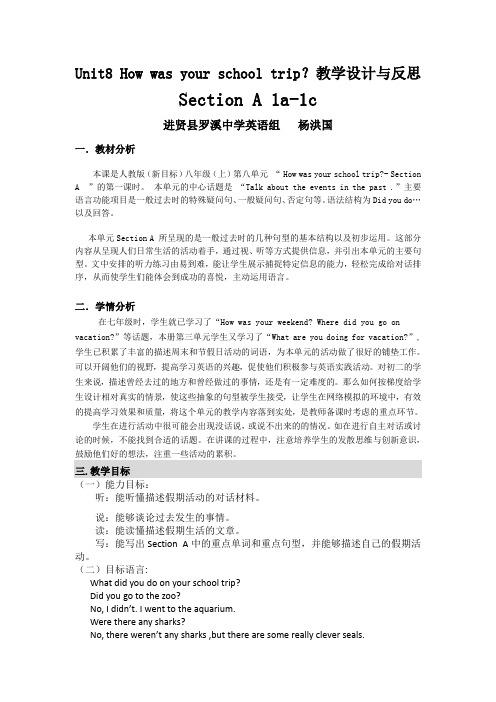
Unit8 How was your school trip?教学设计与反思Section A 1a-1c进贤县罗溪中学英语组杨洪国一.教材分析本课是人教版(新目标)八年级(上)第八单元“ How was your school trip?- Section A ”的第一课时。
本单元的中心话题是“Talk about the events in the past .”主要语言功能项目是一般过去时的特殊疑问句、一般疑问句、否定句等。
语法结构为Did you do…以及回答。
本单元Section A 所呈现的是一般过去时的几种句型的基本结构以及初步运用。
这部分内容从呈现人们日常生活的活动着手,通过视、听等方式提供信息,并引出本单元的主要句型。
文中安排的听力练习由易到难,能让学生展示捕捉特定信息的能力,轻松完成给对话排序,从而使学生们能体会到成功的喜悦,主动运用语言。
二.学情分析在七年级时,学生就已学习了“How was your weekend? Where did you go on vacation?”等话题,本册第三单元学生又学习了“What are you doing for vacation?”,学生已积累了丰富的描述周末和节假日活动的词语,为本单元的活动做了很好的铺垫工作。
可以开阔他们的视野,提高学习英语的兴趣,促使他们积极参与英语实践活动。
对初二的学生来说,描述曾经去过的地方和曾经做过的事情,还是有一定难度的。
那么如何按梯度给学生设计相对真实的情景,使这些抽象的句型被学生接受,让学生在网络模拟的环境中,有效的提高学习效果和质量,将这个单元的教学内容落到实处,是教师备课时考虑的重点环节。
学生在进行活动中很可能会出现没话说,或说不出来的的情况。
如在进行自主对话或讨论的时候,不能找到合适的话题。
在讲课的过程中,注意培养学生的发散思维与创新意识,鼓励他们好的想法,注重一些活动的累积。
三.教学目标(一)能力目标:听:能听懂描述假期活动的对话材料。
八年级英语Unit 8 How was your school trip?新人教版

Unit 8 How was your school trip?一、知识目标1)教学生掌握动词的过去式中规则动词和不规则动词的变化形式2) 教学生掌握一般过去时的肯定句,否定句及一般疑问句3)教学生掌握运用一般过去时描述过去发生的事情二、能力目标1)听:能听懂描述假期活动的对话材料。
2)说:能够谈论过去发生的事情。
3)读:能读懂描述假期活动的文章。
4)写:能写出SectionA和Section B中的重点单词和重点句型,并能够描述自己的假期活动。
三、策略目标1) 教学生学会通过看、听、说和讨论来获取已有的信息。
(看图作问答)2)通过小组活动学习,学生能自由谈论自己做过的事。
(个体与群体思维)3)通过本单元谈论过去发生的事情,可从谈论学校郊游引出话题,从而导入一般过去时的使用,学会描述过去做过的事情。
(个性化学习)四、德育目标1)通过本单元的学习,对比过去与现在,培养良好的行为习惯。
2)通过生态旅游学习,学会保护大自然,陶冶情操。
五、重点与难点1)重点:掌握一般过去时的一般疑问句形式:a. Did you +动词原形…?b.Were you +表语…?2)难点:规则动词的过去式与不规则动词把握及运用。
a.规则动词:1)一般情况动词后加-ed: ask—asked2)有e结尾加-d:dance—danced3)双写情况再加-ed:stop—stoppedb.不规则动词:have—had, go—went, do—did, are—were六、教学准备1)some pictures about places of great interest2) A tape-recorder, multi-medium,3)教学课时为五课时第一课时(The First Period) Look, speak and Listen for Section A一、Teaching process designStep 1: Warming up and lead inGreeting and show students some pictures about places of interest such as the Great Wall, Tian’anmen Square, Jiouzaigou.Lead in with such questions: 1. Do you enjoy your holiday? –Yes, very much. 2. Did you go to the places which are shown in the pictures? Yes, I did. 3.When did you go there? Last holiday. 4.What did you do there? I took photos and bought a souvenir. Who did you go with? With my parents.They may elicit various answers. Ask students to work in groups to make a list about where to go for their last school trip and what to do there.Then the teacher focuses on the picture and asks students:T: Who is the girl with a shark on her head?S: She is Tina.T: Where did she go for her last school trip?S: She went to the aquarium.T: What did she do there?S: She took photos, saw some seals, bought a souvenir, ate some ice cream, … and so on.Next, the teacher leads students to practice listening. Everybody has his own way to enjoy his school trip like Tina’s. The experience of each person is quite different from the others’. They may go to the zoo or go to the aquarium. Let’s listen to the tape in 1b and see where Tina went and what she did there. The tape is about Tina’s partner is asking Tina about her last school trip. Ask students to listen to the recorder carefully and circle the expressions in the box.After listening,the teacher lists what students heard with a form on the blackboard to check the answers like this:Then get students to learn the irregular form of the past verbs:Go—went, take—took, have—had, eat—ate, hang—hung, see—saw, buy—bought, are—were,do—didStep 2: PairworkBefore working in pairs, students should remember the expressions in 1b. Give students a few minutes to review the expressions. After that ask students to discuss what the children in the picture do on their last school trip to follow the sample dialogue:A: Look at Tina. What did she do on her last school trip?B: She went to the aquarium.A:What did she see there?B:She saw some smart seals.A: I like smart seals, but I never go there. Did she see any sharks?B: No, there weren’t any sharks.A: Did she buy a souvenir?B: No, she didn’t. Her friend Grace bought a souvenir.A: Did she hang out with her friends there?B: No, she didn’t. She took photos.A: Did she have pizza?B: No, she ate some ice cream.The teacher moves around the classroom and give some help as needed. Ask pairs of students to show their work. Praise them for their excellent work.Step 3: Look, Listen and Write2a & 2b provide guided listening and writing practice using the target language. The teacher asks students to listen to the tape and check the questions they hear with “∨”.1.____ Did you buy that hat?2._____ Did you win that hat?3.____ Did you take any photos?4.____ Did you get his autograph?5. ____ Did you see any sharks?6.____ Were there any seals?7. ____ What else did you do?Ask students to pay attention to the structures of the sentences. Explain the underlined parts to students.And tell the difference between them.Did + subject +original verb…?Affirmative answer:Yes, I/we/they/she/he did.Negative answer:No, I/we/they/she/he didn’t.Wh-word +did + subject +original verb…?Answer Wh-question with a statement sentenceWere +there + noun pl…?Affirmative answer:Yes, there were. Negative answer:No, there weren’t.Now ask students to listen to the tape and circle “T” or “F” while they are listening.Then check the answers with students by asking students some questions like this:T: Did Tina meet a famous actor?S: Yes, she did.T: Did Tina get Jake Dean’s autograph?S: Yes, She did.T: Did Toby win a prize?S: No, he didn’t.T: Did Tina win a hat?S: Yes, she did.T: Were there many actors at the aquarium?S: No, not too many.T: Thank you all.Then ask students to make sentence transformation from a state ment sentence to a “Yes or No”question with the sentences given in 2b:Answers: 1. Did Tina meet a famous actor?2. Did Tina get Jake Dean’s autograph?3. Did Toby win a prize?4. Did Tina win a hat?5. Were there many actors at the aquarium?And list the past forms of the irregular verbs: meet—met, get—got, win—won, are--were. Then read them. (Finish 2b)Step 4: Practice with pair workAsk students to make a dialogue by asking and answering questions according to the information in activity 2b in order tostart oral practice using the target language with the following sample like this:A: Did Tina meet a famous actor?B: Yes, she did. She met Jake Dean.A: What did Tina get from Jake Dean?B: She got an autograph.A: Did Tina win a prize?B: No, she didn’t. She won a hat.A: Were there many actors at the aquarium?B: No, not too many.Then ask students to work in pairs and practice the conversation above. While students are working, the teacher is moving around the room giving some help as needed. Ask pairs of students to show their works. Praise them for their good works.(finish 2c)Step 5: Homework1) Sum up the Past Tense sentence & the past forms of the irregular verbs.2) Preview 3a ,3b & 4 on Page 49.二、Word Explanation1. else adv.其他,另外,别的。
上册Unit 8 How was your school trip

年级初二学科英语版本人教版(新目标)课程标题上册Unit 8 How was your school trip?编稿老师康文岗一校黄楠二校李秀卿审核崔小芳一、学习目标:1. 知识目标:掌握本讲所学的词汇、短语和句型。
2. 能力目标:学会和别人谈论过去发生的事情。
3. 情感目标:学会合理安排业余时间,在周末、节假日多参加一些有益的活动。
二、重点、难点:重点:单词win, off, luckily;短语hang out, at the end of, have fun;句型:1. Did you go to the zoo?2. Were there any sharks?3. What else did you do?难点:win与beat的用法;else与other的用法;一般过去时的一般疑问句。
三、知能提升(一)重点单词[单词学习]◎win【用法】win 动词,意为“赢得,打败,战胜”,后接的宾语一般是war, match, game 以及表示名次、奖品等的名词。
【例句】1. Their team won the game last time.2. He won a prize yesterday.【考查点】辨析:win与beatbeat 也可表示“打败,战胜”的意思,但后面只能接表示人的词作宾语。
We weren’t sure whether we could beat them.win 其后接的宾语不是表示竞争对手的人,而是表示比赛、战斗、奖品等的物。
beat 其后只能接表示人的词,表示一方赢了另一方。
【易错点】没注意宾语而将两词混淆。
【考题链接】We the basketball match yesterday. That’s really an exciting match.A. winB. wonC. beatD. got答案:B解题思路:win意为“赢了(比赛、战争),获得(奖金、荣誉)”,当此意讲时,其后不能接人作宾语;beat意为“战胜某人”,其过去式也是beat;而get意为“得到,获得某物”。
八年级英语上册Unit8HowwasyourschooltripSectionB知识点和练习人教新目
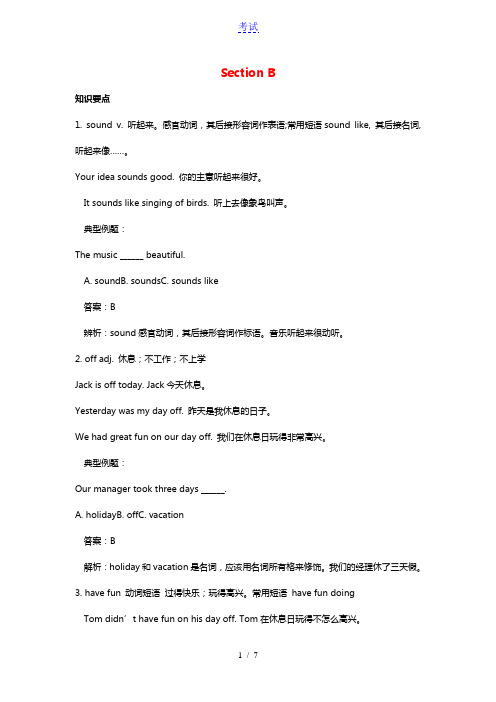
Section B知识要点1. sound v. 听起来。
感官动词,其后接形容词作表语;常用短语sound like, 其后接名词,听起来像……。
Your idea sounds good. 你的主意听起来很好。
It sounds like singing of birds. 听上去像象鸟叫声。
典型例题:The music ______ beautiful.A. soundB. soundsC. sounds like答案:B辨析:sound感官动词,其后接形容词作标语。
音乐听起来很动听。
2. off adj. 休息;不工作;不上学Jack is off today. Jack今天休息。
Yesterday was my day off. 昨天是我休息的日子。
We had great fun on our day off. 我们在休息日玩得非常高兴。
典型例题:Our manager took three days ______.A. holidayB. offC. vacation答案:B解析:holiday和vacation是名词,应该用名词所有格来修饰。
我们的经理休了三天假。
3. have fun 动词短语过得快乐;玩得高兴。
常用短语have fun doingTom didn’t have fun on his day off. Tom在休息日玩得不怎么高兴。
Did you have fun yesterday? 昨天你们玩得高兴吗?We had fun riding our bicycles to the aquarium on Sunday. 星期天我们骑自行车去水族馆玩得很高兴。
典型例题:We have fun ______ (play) puter games.答案:playing解析:have fun doing固定短语,做某事很有乐趣。
4. luckily adv. 幸运地。
注意该词的词性变化,形容词lucky;名词luck;反义词unluckily/unlucky。
八年级英语上册 单词巧记+句型语法剖析《Unit8 How was your school trip》教案 人教新目标版
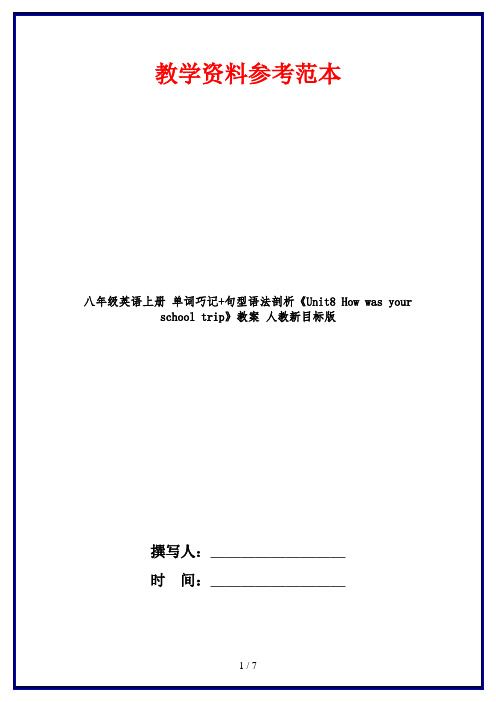
赢;获胜wing(翅膀去掉gWe shouldn’t win without your support.没有你们的支持我们是不会赢的。
它的过去式和过去分词:won获胜者后面加人或比赛;beat后面加球队。
海安九校联考)Our team theirs by the score 2-1 in the final football match.[访问者;参观者;游客or(名词后缀)He has had a lot of visitors lately.后缀构成的名词:inventor 发明家参观visit的正确形式填空1)The from foreign countries are visiting the Great Wall.2)Lucy has many places of interest in Beijing.2)visited结束;结尾掉了头The book does not tell the readers the end of the这本书没有把故事结局告诉读者。
【考点聚焦】与相关的短语:at the end of到……末;in the end 最后,终于【活学活用】3.this term,we have learned for three hundred words.A.At the end ofD.From the endoutdoor [Football and cricket are outdoor games.足球和板球都是室外运动。
indoorin the open air翻译句子现在大多数人喜欢户外活动。
Most people today like the outdoor games.驾车旅行(司机)去掉rWe had a pleasant drive.我们驾车出去愉快地玩了一次。
作动词讲时,过去式是drove,go for a drive 开车兜风[休息;不工作……的)+fCan I have the day off tomorrow?明天我可以请假吗?【考点聚焦】掌握与off有关的短语:see sb.off为某人送行;take off 脱去;【活学活用】Do you know when Tom went to Shanghai?Last Sunday.And I went to the station to him .A.see;offB.put;offC.get;offD.set;off[)No wind,no rain.同根词:rainy 下雨的a heavy/light/fine/spring rain选择If it tomorrow,I will stay at home.C.will rain[I am saving for the future.我在为往后的生活存点钱。
新目标人教版八年级英语上Unit8Howwasyourschooltrip学案

新⽬标⼈教版⼋年级英语上Unit8Howwasyourschooltrip 学案Unit 8 How was your school trip姓名:第⼀课时Section A (1a—2c)⼀、教师寄语:There will be no regret and sorrow if you fight with all your strength. (只要全⼒拼搏了,就没有遗憾,没有后悔。
)⼆、学习⽬标知识⽬标:1. 词汇:gift, shark, aquarium , seal, souvenir , hang, hang out, win ,(won ), autograph, prize.2. 语⾔:How was your school trip? Did you win that hat? Were there any sharks?3. 语法:学习⼀般过去时及There be 句型的⼀般过去时能⼒⽬标: 学会询问“……怎么样、做了什么事”三、教学重点、难点:学习⼀般过去时, 及规则和不规则动词的过去式。
⼀般过去时的⽤法.四、学习过程:Step 1 预习导学或⾃测,按要求写出下列各词:1. visit______(过去式)2. photo________(复数)3. take________(反义词)4. put________(过去式)5. pour________(现分词)6. win________(过去式)7. gift________(同义词)8. fun________(形容词)9. begin________(同义词)10. wild________(⽐较级)11. athletic________(⽐较级12. where______(同⾳词)13. near________(反义词)14. leave________(过去式)15. she________(名物代词)16. sick________(同义词)17. right________(同⾳词)8. foot________(复数)19. they________(宾格)20. knife________(复数)Step 2 语法:⼀般过去时⼀般过去时指在过去某⼀段时间内发⽣的动作或存在的状态,常和表⽰过去意义的时间状语连⽤.1.⼀般过去时:动词⼀般过去时,表⽰过去发⽣的事;be⽤was或⽤were, have,has变had;谓语动词过去式,过去时间作标志;⼀般动词加-ed,若是特殊得硬记。
- 1、下载文档前请自行甄别文档内容的完整性,平台不提供额外的编辑、内容补充、找答案等附加服务。
- 2、"仅部分预览"的文档,不可在线预览部分如存在完整性等问题,可反馈申请退款(可完整预览的文档不适用该条件!)。
- 3、如文档侵犯您的权益,请联系客服反馈,我们会尽快为您处理(人工客服工作时间:9:00-18:30)。
Unit 8 How was your school trip ? I.Teaching objectives 单元教学目标II. Teaching materials analyzing and rearranging 教材分析和教材重组1. 教材分析本单元谈论的话题是“School trips”,通过单元学习,要求学生掌握如何用过去时态谈论过去发生的事情,并能应用过去时态讲述一个故事,写一封信。
语法结构要求掌握由what和how引导的特殊疑问句以及Did和Were引导的一般疑问句。
在了解目标语言的基础上,要求学生能读懂描述过去经历的文章,并进行模仿写作训练,描述一段不寻常的经历。
Section A 1a通过让学生列出上个假日所做的事情,导入本单元的话题。
1b 是一个听力活动,要求学生听录音,圈出正确的答案。
学生将从听力材料中感知目标语言即一般过去时,并了解一些动词短语的用法。
1c是一个对话活动,学生结对练习1b中听到的对话,并根据页首的图片内容进行模仿会话练习,练习Did you...?和Were there...?的句型。
2a和2b是两个听力练习,帮助学生掌握一般过去时的一般疑问句和特殊疑问句的不同用法。
2c是一个小组活动,要求学生根据2b的信息,仿照例句练习用Did...? 编对话。
3a呈现的是一篇九班学生的学校之旅的阅读文章,要求学生根据文章内容改正几个句子,检验学生对目标语言的认知程度。
3b是对学生目标语言应用能力的检验,要求学生列出自己去过的地方以及在这些地方所做的事情,然后用所给的短语结对进行会话练习,进一步练习Did you...?和Were there...?的句型。
4是一个小组活动,要求学生接龙编故事,在娱乐中应用一般过去时讲述故事。
Section B 1a列出了一些活动,要求学生根据自己的喜好程度为其排序,为后面的功能话题作铺垫,并掌握几个动词短语的含义。
1b则是在1a基础上的口头练习,要求学生结对讨论上面的答案并给出理由,掌握表达看法或感受的方法,进一步拓展了本单元的功能话题。
2a和2b是两个听力练习,要求学生听录音,判断Tina 和Tony在上个假日中分别做了哪些事、说了哪些话。
2c是一个会话活动,要求学生结对讨论他们的上个假期,练习一般过去时的同时进一步巩固表看法或感受的表达法。
3a是一篇Nick 写给Tom的一封关于假日活动的信,要求学生根据信的内容列出Nick那天所做的事情并写出自己对这个假日的看法。
3b和3c要求学生仿照上面的阅读文章用目标语言进行应用写作训练。
4要求学生运用所掌握的过去时,结合给出的短语和图片内容进行会话练习,是对过去时一般疑问句、特殊疑问句及肯定否定回答的综合训练。
Self check 1要求学生用所给单词的正确形式填空,并能用这些词来造句,强化学生对重点词汇的理解和掌握。
2 根据提示问题给一个朋友写一封信,介绍自己的假期活动,是对学生语言应用能力的检验。
2. 教材重组和课时分配Period 1 (Section A:1a, 1b, 1c)FunctionPeriod 2 (Section A:2a, 2b, 2c, Grammar focus)GrammarPeriod 3 (Section A:3a, 3b, 4)Reading and SpeakingPeriod 4 (Section B:1a, 1b, 2a, 2b, 2c)Listening and SpeakingPeriod 5 (Section B:3a, 3b, 3c, 4, Self check)Reading and Writing教案Period 5 Reading and WritingTarget language 目标语言1. Words and expressions生词和短语DVD, yard, yard sale(yard sale(庭院售物)又称garage sale(车库售物)、porch sale 或moving sale,是美国一种独特的售物方式。
), luckily, umbrella, rain coat, wet2. Key sentences 重点句子Did you have fun camping?I didn’t have a very fun day.Luckily, we brought our umbrellas and raincoats, so we didn’t get wet.Ability goals 能力目标Enable the students to write a letter about their day off.Learning ability goals 学能目标Help the students learn how to write a letter with simple past tense.Teaching important and difficult points 教学重难点Write a letter about a day off.Teaching procedures and ways 教学过程与方式Step I Revision and Lead-inGreet the class as usual and check the homework.T: Do you remember what Class 9 did on their school trip? Who can retell the story to us? Ladies, first!Show the pictures on the screen again. These will help the students to remember the main events.Sample version:On the last school trip the students from Class 9 had a wonderful time. They went to Blue Water Aquarium. They visited the Visitors’ Center and watched a movie about sharks. Then they watched a dolphin show. It was very interesting. Next they went to the Outdoor Pool and saw a big octopus. After lunch they went to the Gift Shop and bought lots of souvenirs. Finally they went back to school by bus. The class monitor cleaned the bus after the trip. The driver and the teacher were very happy.T: Yesterday, we learned about what Tina and Tony did on their last day off. What was their last day off like? Was it a good day off?Ss: No, it was awful. (It was terrible.)T: Today, we will learn something about Nick and Tim’s day off. Did they have a good day off or a terrible day off? Make a guess.Ss: ...Step II Reading (Section B 3a)T: Turn to page 51, activity 3a. Read the letter. Make a list of the things Nick and his uncle did that day.Nick1. visited his cousin2. stayed in the house3. watched DVDs4. played computer games5. readUncle Martin1. put some of his old things out2. had a yard saleT: So did Nick have a good day off? What is your opinion about his day? Write it down.Ask some students to read their opinions.Then play the tape and let students read after it. Check their pronunciation and intonation.Language points:★have fun + doing 意为“做某事很快乐”e.g. We are having fun playing on the playground.★put ... out“把……拿出来”e.g. Please put your English books out on the desk.★all day“一整天”It snowed all day. The field was all white.Step III Writing practice (Section B 3b, 3c)T: This is a letter from Tom to Nick. Tom told Nick about his day off. Read this letter and fill in the blanks. Use the words or phrases you have learned in this unit.Then let students read the letter to their partners and check the answers with each other. Any answer that makes sense is right.Ask a boy or a girl to the front and write down his/her answers on the blackboard. Dear Nick,Thanks for your letter. I’m sorry you didn’t have fun on your day off. My day off was fun. I went to Jinci Park, and visited an aquarium. It was very beautiful. We saw many sharks and seals. I bought a small toy shark. It was a really great day. See you soon.Your s,Tom Read and check the letter with the whole class.Then deal with activity 3c.T: Now write a letter and tell us what you did on your last day off. First make a list of ideas before you begin to write the letter. In your letter you must include Activities, Places, Description words. Make a list of at least three things under each heading. You’d better write at least six or seven sentences.After they have finished, ask some students to read their letters to the class.Step IV Pairwork (Section B 4)In this step, students will work in pairs and ask and answer questions about each other’s last vacation.T: Work in pairs. Students A, look at this page. Student B, look at page 85. Try to find out about each other’s vacation. You can use the questions above the pictures to ask your partner for information. And answer your partner’s questions according to the pictures given. Clear?Ask some pairs to act it out in class.Step V Homework1. Make a list of the verb phrases you have learned in this period and remember them. have fun + doing, visit sb, stay in the house, watch DVD, play computer games, put sth out, yard sale, get wet2. Finish the exercises in Self check.。
